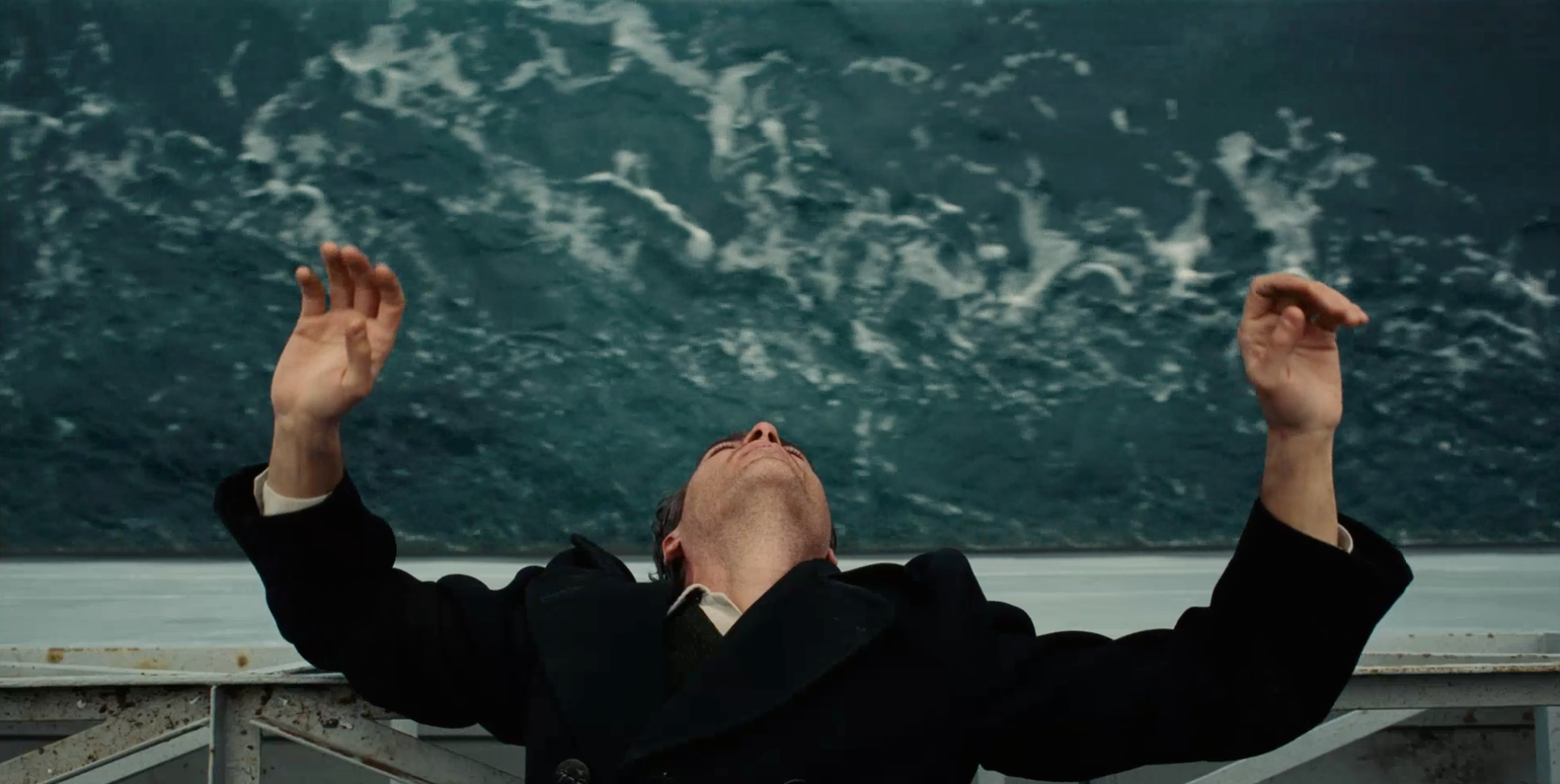The Master (15) 137 mins ****
Rust and Bone (15) 120 mins ***
The protagonist of Paul Thomas Anderson’s The Master is a sailor who, even on dry
land, finds himself adrift. Freddie Quell (Joaquin Phoenix) emerges from navy
duty at the end of WW2 with only a crippling drink problem to his name. Not for
Freddie the upwardly mobile trajectory of post-War consumerism. Instead, he
bobs from job to job, learning only that the photographer’s darkroom provides
ideal cover (and ingredients) for cocktail-mixing, and that it’s not good form
to poison your fellow cabbage-pickers with cheap grog. “Get Thee Behind Me,
Satan”, from Follow the Fleet, floats
on the soundtrack: whichever way Freddie tacks, he’s a man pursued by demons.
The sea, meanwhile, continues to call. One night,
Freddie stumbles aboard the boat of one Lancaster Dodd (Philip Seymour
Hoffman). The founder of a crypto-scientific organisation referred to as “The
Cause”, Dodd modestly bills himself as “a writer, a doctor, a nuclear
physicist, a theoretical philosopher – but, above all, a man”. Upon hearing
such an introduction, you or I would doubtless jump ship, but then we wouldn’t
have a quart of paint stripper rolling around in our guts. Freddie is easily
taken in, but not so easily quelled; where a calming, feminine influence might
help, instead he’s made subject to Dodd’s provocation and power games.
Is Lancaster Dodd modelled on L. Ron Hubbard, who
founded Scientology in 1952? Our lawyers insist you decide. The Cause solicits
those with more money than sense; its followers’ belief in a cosmic conflict “a
trillion years in the making” doesn’t sound so far removed from Battlefield Earth. Yet wherever they
came from, Dodd and Freddie absolutely fit the framework of Anderson’s
perfectly controlled films about the limits of masculine control: think of
cocksure Tom Cruise, undone by emotion in Magnolia,
or Daniel Day-Lewis’s oilman Daniel Plainview in There Will Be Blood, succumbing to capitalism’s most monstrous
excesses.
Anderson allows this new film a scene-to-scene
spontaneity, but a certain steeliness of vision runs through it. Freddie is a
more difficult character than even Plainview: Phoenix, in a display of skilful
shambling, slurs through his dialogue, flags up Freddie’s essential puerility,
and rarely seeks our sympathies. The usually genial Hoffman similarly operates
at arm’s length. Part figurehead, part showman, he’s Joe Stalin playing Oliver
Hardy, slicking down his tie and eyebrows with an iron fist – and Anderson
refuses obvious satire by making Dodd as terrifyingly credible as he is
deluded. There are reasons why the Hubbards of this world exercise power.
Increasingly, Anderson’s films are leaving behind
the surface falsity of the entertainment industry, so magnificently described
in Boogie Nights and Magnolia, in favour of the elemental:
sand, wood, waves, characters who scrabble in the dirt. He, too, has been
digging – into pornography, then capitalism, now religion, each time bringing a
keenly critical eye to scrutinising our needs and desires. The conclusions he
uncovers in The Master aren’t always
comforting, but there’s no-one currently working in the American cinema telling
stories more important to where his society is at, and there’s no-one telling
these stories better.
The drifters in the oddball French romance Rust and Bone are of the contemporary
variety. Ali (Matthias Schoenaerts) arrives in the South of France, leaning
heavily on the hunter-gatherer instincts he’s honed as a sometime boxer. Of
nurturing qualities, however, he has none, as witnessed by a regrettable
tendency to knock his young son around. Enter the mollifying Stephanie (Marion
Cotillard), an animal trainer at a nearby water park, whose fate is coupled to
the wet stuff like hydrogen to oxygen. The couple meet after a nightclub fight,
when she provides ice for his swollen fists; when a bizarre killer whale
accident deprives Stephanie of her lower limbs, it’s to Ali that she turns.
Gone is the gruelling realism of director Jacques
Audiard’s earlier A Prophet, replaced
by Oz-like fantasy. Ali is the
strongman in need of a heart; our Steph is all that, but hasn’t a leg to stand
on. That Rust and Bone is both
striking and strangely resistible can be attributed to the way it pushes the
idea of opposites attracting to a borderline preposterous extreme. The question
Audiard’s film boils down to is simple: could you love an incredibly beautiful
woman with prosthetic limbs? The answer’s yes, of course, but it takes another
hour for Ali’s knuckle-dragging cerebrum to formulate this response. Sentient
lifeforms might spot that this is no ordinary pick-up, but Marion Cotillard;
hell, even the killer whale was trying to devour her whole.
The Master opens at the Odeon West End, London this weekend, before going nationwide on November 16; Rust and Bone is in selected cinemas.

No comments:
Post a Comment